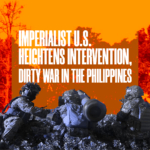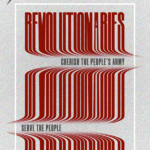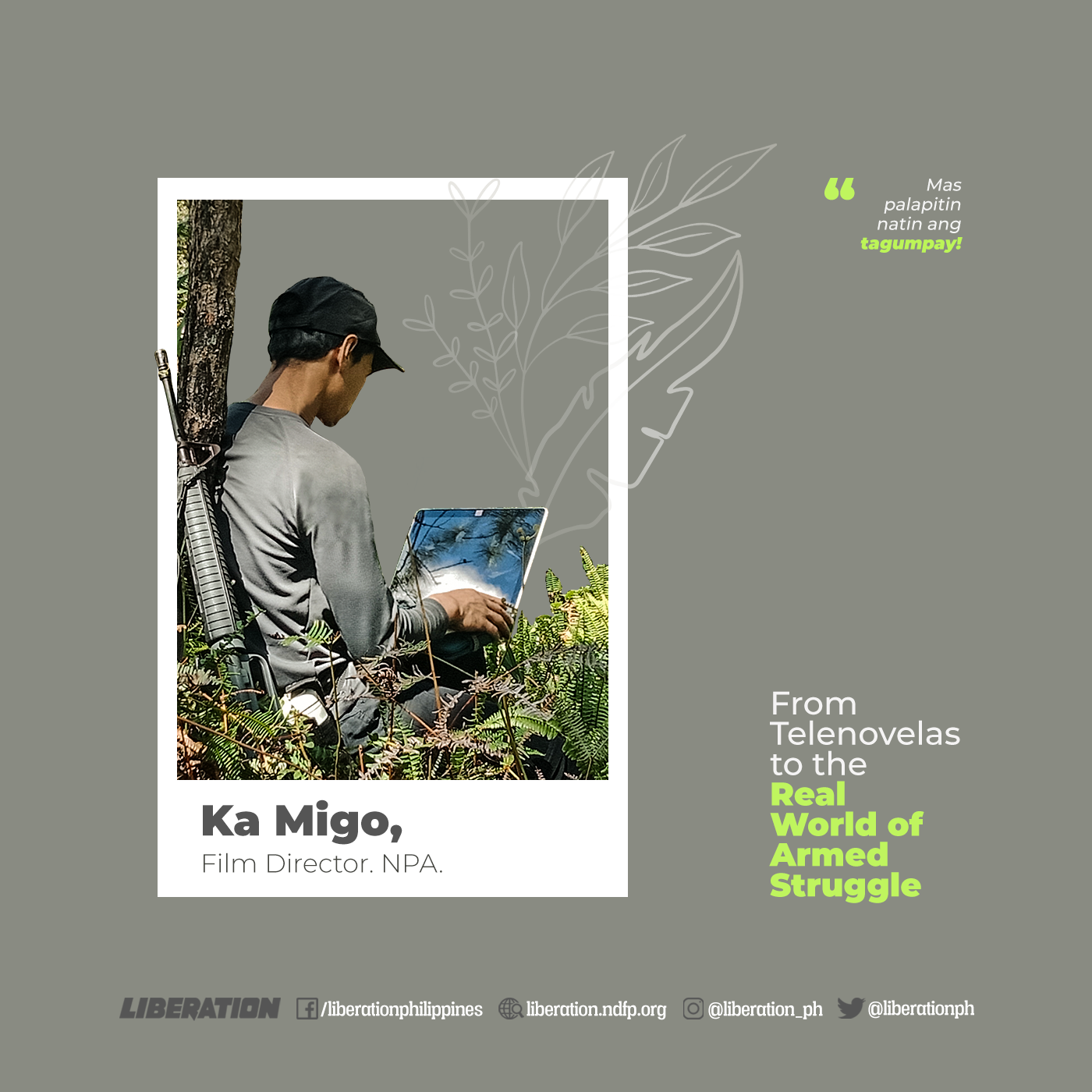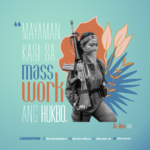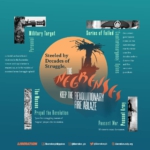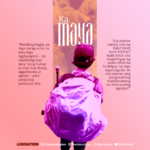Happiness is in the Revolution
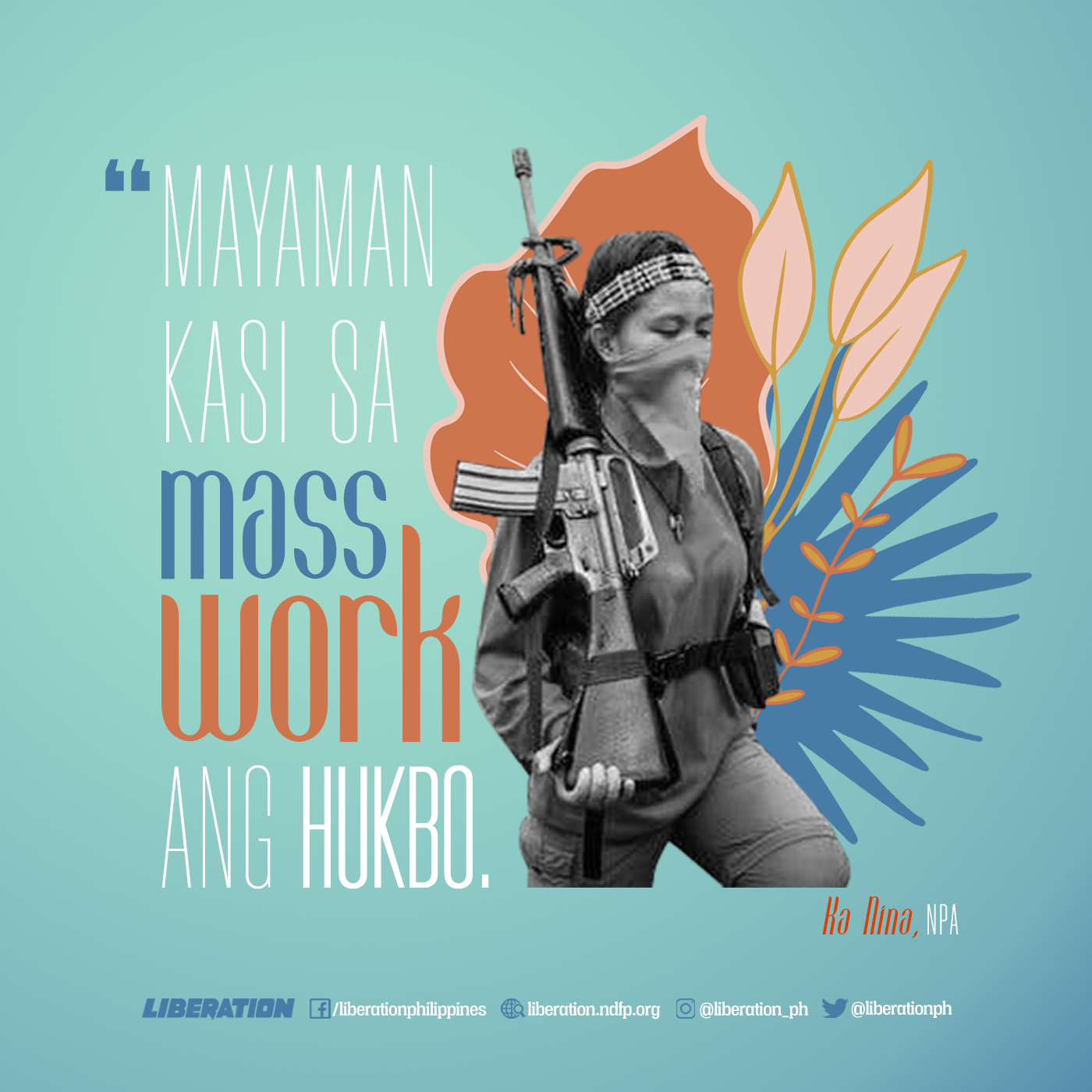
In truth, it was never what she expected.
After five years in the New People’s Army (NPA), Ka Nina, who was a youth activist, admitted a lot of her earlier perception of what a Red fighter is had changed.
For one, she thought Red fighters don’t know how to laugh, “Akala ko laging seryoso. Laging politika ang inilalabas ng bibig. Di marunong tumawa. Kaya laking gulat ko pagpasok ko dito sa sonang gerilya dito sa aming rehiyon (in Bicol) napakakwela pala ng mga kasama (I thought they were always serious, unsmiling, and talking only about politics. So I was surprised they were a cheery bunch when I came to the guerrilla zone here in Bicol),” she commented. They laugh at the littlest of things—when a dog that passes by, while practicing new songs, the pronouncements of Pres. Duterte. It must be “because we know we always face a life and death situation. That brings us closer and builds our rapport and camaraderie,” Ka Nina explained.
Ka Nina’s life in the NPA was far from the image she once held about the red fighters. Even as an activist she had no idea what kind of life they lived. Curiously, Ka Nina found her way into a guerrilla zone. And she stayed on. “Perhaps it was also because as a student activist, I saw the brutality of the state—in rallies, in picket lines,” she added.
Life with the masses
Half a decade in the people’s army, Ka Nina’s integration with the masses sustained her even as she misses her family and friends. “Mayaman kasi sa mass work ang Hukbo. ‘Yun ang isa sa pinakamahalagang salik kung paano namin napapangibabawan yung mga sakrispisyo, mga hirap, mga pisikal na pagod,” she narrated. Sharing stories with the masses erases their tiredness. “Kahit na wala ka pang kain buong araw. (Even if we haven’t eaten the whole day).”
We do a great deal of mass work. That must be one factor why we are able to overcome sacrifices, hardships and physical difficulties.
She was bursting with stories on her life with the masses. Asked to give a highlight, she begged, “pwede pong dalawa? (May I share two?).”
The first story she loved to tell and retell was when she was still new in the NPA. “Nag-ikot kami sa bahaging coastal area. Tapos yung masa doon talagang hirap sila sa pananim. Sabi nila, wala daw tumutubo doon sa lupa nila. Hirap din sila sa tubig tapos wala rin silang mga ipantatanim (As we went around the coastal community we saw the difficulties of the masses to grow plants. Nothing grows on the land. They have no fresh water and they don’t have anything to plant),” she related. Through the efforts of the comrades and the organized masses, they were able to solicit cassava cuttings and distributed these to the community members for planting. “They were so euphoric. They hugged us. That was great. It was satisfying to have done something for the masses,” Ka Nina exclaimed as she relived the moment.
The second story was when their unit had an encounter with the military. Two comrades fell, recalled Ka Nina. The masses went with them to retrieve the remains of the comrades. “It was a long walk, it was raining, and worse, we had to pass through enemy lines.” When the community members got to the place, they immediately tended to the remains of the comrades, like their own. “Bagamat malungkot ang pangalawang halimbawa na binigay ko, isa po ‘yun sa pinakamatingkad na karanasan ko kung gaano kamahal ng mga masa ang mga kasama, (The story may be sad but I just wanted to show how the masses love the comrades),” Ka Nina noted.
Collective life
Like the masses, Ka Nina’s collective carried her through hard times. “When you feel weary and weak because you miss your family, the collective is there to guide you, help you, listen to how you feel.” She said all their concerns are discussed in the collective. “Lahat ng bagay dito sa Hukbo—problema mo sa pagkain, sa pagdumi, kalungkutan— napag-uusapan, nabubutbot po yung mga ganun tapos nagagawan ng solusyon. (We discuss everything in the collective—food, poop, loneliness. We dissect and find solution to everything).”
It has also never been a problem that she is a woman. “Totoo na may pantay na pagtingin sa kababaihan dito sa loob ng rebong kilusan.
It is true. Women in the revolutionary movement are treated equally and fairly.
In her five years with the NPA, or even when she was still an activist, she claimed she has not experienced discrimination.
She admitted though that this is not true for all the masses they meet and so they have to reorient the masses on this. The same goes for the new recruits in the NPA. But the new recruits, Ka Nina said, immediately get it, citing “We are together 24/7, death is always upon us, we could encounter the enemy anytime” as possible reasons.
“Ang sabi nga ng mga kasama dapat laging maging handa, babae ka man o lalaki kasi di namimili ang punglo. Babae ka o lalaki, tatamaan ka niyan. Sa pagpapaputok ng baril, di mo kailangan macho ka o sobrang lakas mo. Babae ka o lalaki, o anuman ang kasarian mo, ang kailangan mo ay ang kapasyahang iputok ang baril. Kalabitin ang gatilyo. (A comrade said we should be prepared, always. It doesn’t matter if you are male or female because bullets don’t discriminate. One need not be macho or tough. Whether you are male, female, or whatever is the gender preference, the most important is the will to fire the gun., to pull the trigger.)”
A new generation of cadres
As the CPP and the NPA celebrate its 50th year, Ka Nina recognized the contributions of the revolutionary movement to Philippine society—from understanding its nature to instituting meaningful changes while advancing the people’s war. “In the last five decades we have proven we can rise above all challenges because what we are fighting for is just and right.”
She sees a bright future ahead with the kind of unity among the people’s army, the masses, and the Party members. There was obviously pride and elation as Ka Nina takes part in the celebration, “Masarap sa pakiramdam kasi umabot yung henerasyon namin sa ika-50 anibersaryo. Napakasarap sa pakiramdam. (I feel joyful because our generation is part of the 50th anniversary.)”
As the conversation closed, Ka Nina cracked her third highlight without a prompt: “Tapos, yung simple po na pagtawag nila lagi sa amin na kasama o Kas, o anak, ganyan po ang tawag nila sa amin. Samantalang dun sa kabila ay kaaway. Ang sarap sa pakiramdam. Talagang tama ‘tong ipinaglalaban natin.
When the masses call us comrade, or Kas [short for kasama, also comrade], or my child while they call the reactionaries as the enemy, that makes us feel good. We know that what we are fighting for is right.
ServeThePeople
PagAsaNgBayan
JoinTheNPA
*Quote from Benito Tiamzon on his June 2014 interview
VISIT and FOLLOW
Website: https://liberation.ndfp.info
Facebook: https://fb.com/liberationphilippines
Twitter: https://twitter.com/liberationph
Instagram: https://instagram.com/liberation_ph


